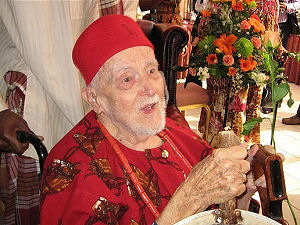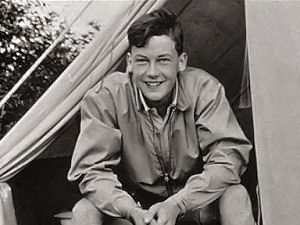Obituary Charles Thurstan Shaw
This obituary for Charles Thurstan Shaw, who died on 8th March 2013, appeared on The Telegraph's website on 31st March.
 The first trained archaeologist to work in what was then British West Africa, during the 1950s Shaw helped to found the Ghana National Museum and the archaeology department at the University of Ghana. In 1959 he was invited by the antiquities department of Nigeria to perform an excavation at Igbo-Ukwu.
The first trained archaeologist to work in what was then British West Africa, during the 1950s Shaw helped to found the Ghana National Museum and the archaeology department at the University of Ghana. In 1959 he was invited by the antiquities department of Nigeria to perform an excavation at Igbo-Ukwu.
Situated near the modern town of Onitsha, south-east Nigeria, the 9th-century site was part of the Nri kingdom, a medieval state which was unusual in that its leader exercised no military power over his subjects. The kingdom existed as a sphere of religious and political influence and was administered by a priest-king called the eze Nri.
Igbo-Ukwu was a burial place for the Nri elite, who were interred with large quantities of grave goods. Artefacts included jewellery, ceramics and glass beads, together with highly sophisticated and elaborate cast bronze vases, bowls and ornaments made with the lost wax technique — among the earliest cast bronzes in sub-Saharan Africa.
At the time the prevailing theories held that West African civilisation and the development of sophisticated crafts such as metallurgy had spread from Mediterranean North Africa. However, the discoveries at Igbo-Ukwu demonstrated that indigenous tribes had become highly sophisticated craftsmen long before they had come into contact with Arabs or Europeans.
Shaw’s two-volume 1970 monograph on the site, followed by his book Discovering Nigeria’s Past (1975) and Unearthing Igbo-Ukwu (1977), helped to lay the foundations for an understanding of the country’s prehistory.
In 1960 Shaw joined the Institute of African Studies at the newly-founded University of Ibadan in Nigeria, and went on to establish a department of archaeology where, over the next 14 years, he helped to provide the country with the best-trained archaeologists of any of the newly independent African states. He was professor of archaeology from 1963 until his retirement in 1974. His contribution was recognised by an international conference held in Ibadan on his 75th birthday in 1989, at which he was made a tribal chief as Onuna Ekwulu Nri and as Onyafuonka of Igboland.
The son of a Church of England clergyman, Charles Thurstan Shaw was born in Plymouth on June 27 1914 and educated at Blundell’s School, Tiverton, where he won prizes for Greek and music (he was a fine pianist), played rugby and cricket and was head of house and president of the school debating society. He then went up to Sidney Sussex College, Cambridge, to read Classics.
 Before going up to Cambridge Shaw had taken part in the excavations at Hembury Fort in Devon under Dorothy Lidell. For Part II of his degree he changed to Archaeology and Anthropology, graduating with a First.
Before going up to Cambridge Shaw had taken part in the excavations at Hembury Fort in Devon under Dorothy Lidell. For Part II of his degree he changed to Archaeology and Anthropology, graduating with a First.
Shaw’s interest in African archaeology also developed early in life, deriving from his father’s interest in the work of the Church Missionary Society and the influence of Louis Leakey, who persuaded him, after graduation, to work in Africa.
Shaw moved to the British colony of Gold Coast (later Ghana), where he became a tutor at Achimota Training College, near Accra, an institution which would train many of the future leaders of independent West African nations. As curator of the college’s anthropology museum he led two major excavations, one of Neolithic and Iron Age deposits at Bosumpra Cave, Abetifi, and the other of a midden, or rubbish dump, at Dawu. He built up the museum’s collections to become the foundation for both Ghana’s National Museum and the Department of Archaeology of the University of Ghana.
Back in England from 1945, Shaw taught at the Cambridge Institute of Education and was actively involved in the Cambridgeshire Village College movement.
After retiring from the University of Ibadan, Shaw returned to Cambridge, where he had been awarded a PhD in 1968. He served as Director of Studies in Archaeology and Anthropology at Magdalene College from 1976 to 1979.
Shaw became a Quaker in the 1960s, serving as an elder and helping to found a new Friends’ Meeting House in Hartington Grove, Cambridge. An outspoken opponent of apartheid, he was instrumental in the decision taken at the 1983 Congress of the Pan African Association on Prehistory at Jos which banned fraternisation with South African academics — a decision which precipitated a crisis at the World Archaeological Conference in 1986. Actively involved in the anti-war movement over many years, in 2000, when he was in his mid-eighties, he was arrested during a demonstration against Trident missiles at the Faslane submarine base.
A keen gardener and long-distance walker, Shaw founded the Icknield Way Association which campaigned to reopen the entire Icknield Way, a prehistoric route from Norfolk to Wiltshire, as a long-distance path. Though the full trail is not yet complete, he won the support of the Countryside Commission and produced the first walker’s guide to the route.
Shaw was founder editor of the West African Archaeological Newsletter and also edited the West African Journal of Archaeology, from 1971 to 1975. He served as president of the Prehistoric Society from 1986 to 1990. He was elected a Fellow of the Society of Antiquaries, whose Gold Medal he was awarded in 1990, and a Fellow of the British Academy in 1991. He was appointed CBE in 1972.
At his 96th birthday party in 2010 Shaw held court in a Cambridge hotel in the brightly-coloured robes of an Onuna-ekwulu Ora, or “the man through whom the history of the Igbo people speaks”, surrounded by scholars from Africa and Cambridge.
He married first, in 1939, Ione Magor, who died in 1992. In 2004 he married, secondly, Pamela Smith, a historian of archaeology, who survives him with the two sons and three daughters of his first marriage.